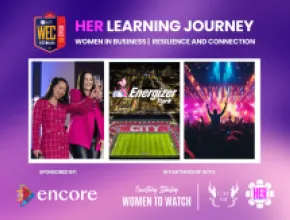The cap and gown ceremony is history and so is the celebrating. You’ve got the evidence (your diploma) that you’ve just completed a grinding four-year or more degree program. But you haven’t been able to open the door on that meeting and event planning career. Should you stay in school and wait for the job market to turn?
Or maybe you’ve arrived at the midpoint of your meetings management career only to have the recession stall your progress. Do you wait out the downturn and burnish your credentials with more education?
In this uber-competitive meetings job market, is education of any stripe the way to advance or even maneuver your career?
Most agree that anyone with eyes on a career in meetings and events management can no longer start or move beyond entry level status with little but on-the-job experience. Most employers want the minimum of a bachelor’s degree in something to even launch a career. But they often don’t pay—as they once did—for the education they want employees to possess or the salaries some graduates expect.
Planners and planner wannabees are left wondering which way to turn. Aspirants wonder whether they should spend the time, money and effort to get the first degree and then settle for an apprentice-level salary in exchange for job experience. Mid-career people question whether education of any kind—academic, industry or online—is really necessary to move ahead.
The Now Market
According to Dawn Penfold, president of The Meeting Candidate Network, Inc. and MeetingJobs.com, there are no magic answers to landing jobs in today’s meetings industry.
"Having a degree remains important because around 80 percent of employers require at least a bachelors, though not in a specific field," she says. "A degree in hospitality and meetings management often helps. But education is never a guarantee of job success."
Employers want it all now—education and experience—in candidates they consider, she notes, adding that anyone with designs on the field should seek a broader knowledge base.
"The problem is that organizations aren’t supporting the education piece as much as they used to," Penfold says. "They don’t send people to conferences or pay for college courses. If you want to take personal time and pay for opportunities on your own, that is sometimes an option."
Sheryl Sookman Schelter, principal at The Meeting Connection, a meetings industry job placement service, says most employers won’t even interview someone who doesn’t have a degree.
"Having a degree may be corporate policy," she says. "And beyond that, companies are finally beginning to understand the value of various certifications. A hiring manager may require a CMP now because they understand what is required in it—like no less than three years of experience in the field."
Even if candidates are just out of school, employers expect them to have some experience in the field, she adds.
"The ideal candidate now has a bachelor’s degree and four to five years of experience," Sookman Schelter says. "Candidates need experience in managing a variety of meetings, like product launches, sales meetings, regional training meetings, trade shows and so on. Employers also like people who have experience with webinars and other types of virtual meeting formats."
Job candidates with the desired qualifications are often disappointed with what’s offered to them, however. Disconnect between candidates and employers over expected compensation is common.
"You can’t walk into a mid-career salary range right out of college," Sookman Schelter says.
Planners who are age 45 and above are especially challenged in today’s economy, according to both Penfold and Sookman Schelter.
"The person over age 45 is at a disadvantage today," Penfold says. "Employers easily find younger candidates who have degrees and experience and will take less money."
Sookman Schelter says she encounters many people who are seasoned in the industry and are grappling with how to make themselves more competitive against younger counterparts. They must keep a youthful perspective and avoid looking dated in the field, she advises. And this often means having a range of software knowledge as well as experience and education.
Educator Response
Educators in the industry and academia have their own set of challenges in responding to evolving learning needs and industry trends.
"Our curriculum must constantly adapt," says Patti J. Shock, professor and director of distance learning at Harrah College of Hotel Administration, University of Nevada, Las Vegas (UNLV). "One of the things we’ve added at UNLV in the last few years is online learning. Students today must work and many have families, so online classes really help them."
According to Shock, the first online classes were mostly for people outside Las Vegas. But that has changed to include many locals. There is no online degree program because some learning must be hands-on, like food and beverage classes.
Any effective meetings/event career program—on- or offline—will include networking and internship opportunities, she says.
"Students must network, because getting ahead in this industry is about who as well as what you know," she says. "We encourage students to attend and volunteer to work at industry association meetings and trade shows so they can meet as many people as possible. We push the supplier side of the industry, not just the planner side."
Shock is also an academic consultant to the LasVegas-based International School of Hospitality, which offers online and in-person certificate programs.
"They are great for people who don’t have the luxury of time or money to devote to a two- or four-year degree," she continues.
The track focuses on a specialized curriculum which doesn’t include the usual assortment of liberal arts courses usually required of college students.
Lalia Rach, divisional dean and HVS professor of the NYU Robert Tisch Center of Hospitality, Tourism and Sports Management, has also seen a lot of changes in academic programs for meeting professionals.
"When I started teaching 25 years ago, I taught meeting planning that was very logistics-based. We focused on the nuts and bolts no matter what level we were teaching," she says. "Today, that is merely one piece of what we offer.
"Today you must be a very complex professional. Nothing is simple and the recession is separating the industry wheat from the chaff. Success today often comes down to business skills. Do you think strategically and are you looking ahead? Are you feeling responsible for your own career? As educators, we can offer the knowledge and direction but ultimately, everyone must be proactive."
Like Shock, Rach encourages her New York-based students to take advantage of New York City’s industry connections as they work through their academic programs.
"We point them to volunteer work at evening events and conferences, summer internships," Rach continues. "We get into the details, too, like what to do at a reception and the importance of writing a thank-you note. One thing I tell all my entering freshmen is to bring a business suit with them to school!"
Resources Outside Academia
Those who don’t have time, money or inclination to pursue an academic degree program have other viable career development options, according to meetings industry educator, consultant and trainer Bonnie Wallsh.
"Instead of going to college, young people can consider a continuing education or certificate program," Wallsh says. "They can get this while they are working."
She notes that there are free and low-cost education resources available in the meetings industry, by Meetings Media (which publishes Meetings South) in the form of its free webinars, along with offerings from other organizations.
"EMC Venues offers a lineup of education workshops on such things as green meetings, F&B programs and meeting planning basics," she says. "So does Affordable Meetings by Hospitality Sales and Management Association International (HSMAI)."
Wallsh agrees with both Rach and Shock about the importance of networking and volunteering to work at conferences and events.
"One must figure out what job—such as registration—will help them meet people and network," she says. "The biggest challenge we have now in teaching younger people about success in business may be about the importance of relationships because so much interaction is online. Social networking is wonderful for some communication, but it doesn’t replace face-to-face.






